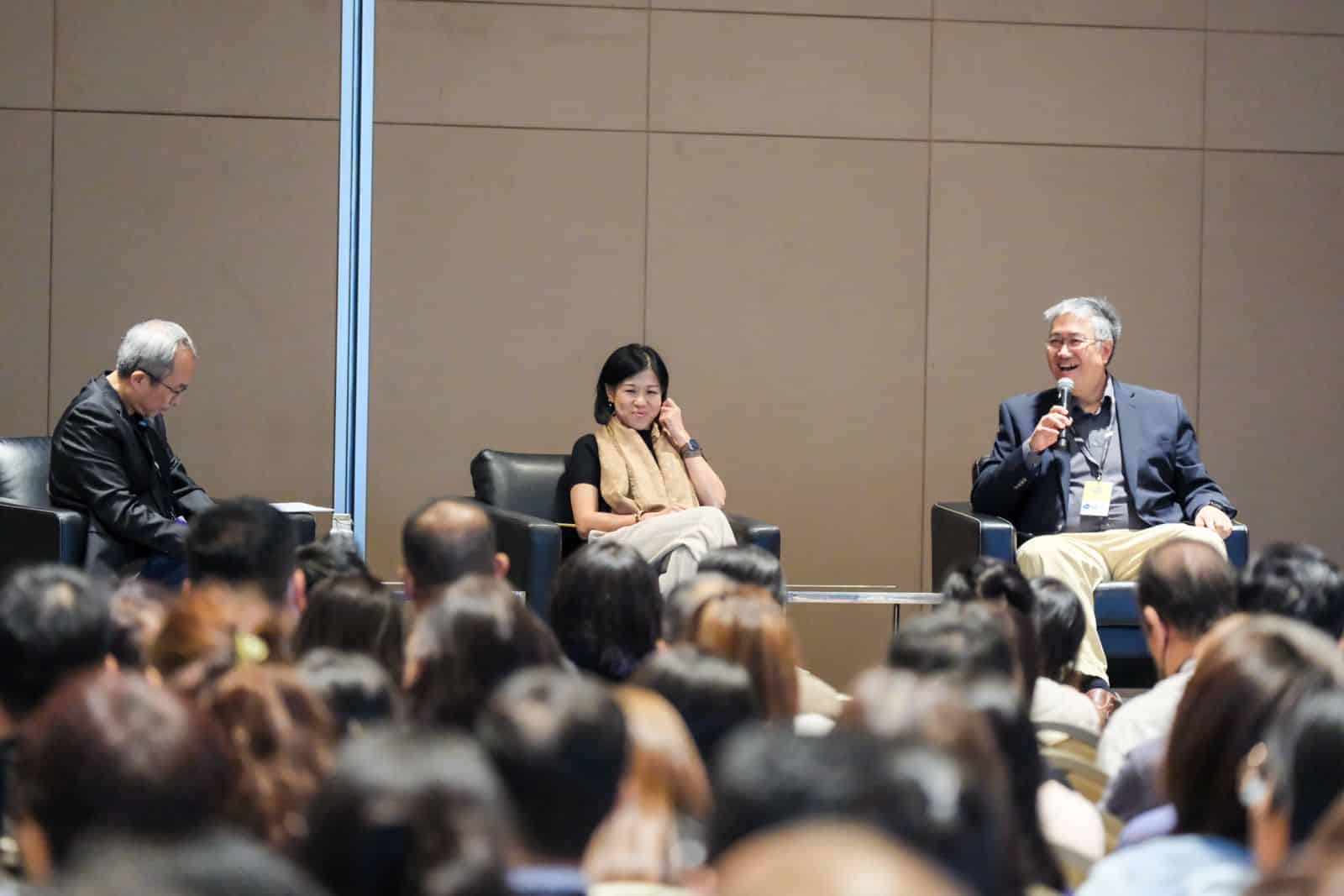Can challenges at work build your faith? Head of research at DBS Timothy Wong on finding meaning in the marketplace
by Gracia Lee // September 18, 2024, 1:12 pm

"The bigger the problem, the more you recognise your own frailty and inability to really solve that problem, and therefore that brings me to my knees in prayer," Timothy Wong, head of research at DBS, said at the recent Intentional Disciplemaking Church (IDMC) conference of how his problems at work have drawn him closer to God. Photo by Keng San.
While work in the corporate world is challenging and tedious on many fronts, Timothy Wong gets out of bed every morning knowing that God has placed him in his job for a reason.
The Managing Director and Regional Head for DBS Group Research, who oversees a 70-strong team of economists, strategists and investment analysts in six Asian offices, believes that even though his job is secular, God is working through him in the marketplace for His good purposes.
Timothy also co-leads Movement Day Singapore, an expression of the Lausanne Movement, and has been leading the Alpha course in The Book Café for the past 20 years.
On a panel at this year’s Intentional Disciplemaking Church (IDMC) conference, Timothy shared how he discovered his purpose at work on the edge of burnout, what has helped him to honour Christ in the marketplace and some tips on how to operate in a workplace that holds to different values.
Below is an excerpt of his responses. It has been edited for length and clarity.
All of us want to find meaning in our work beyond just making money. How did you find that?
Timothy: It was an interesting journey for me. I started my career in 1993 as an analyst and eventually became Head of Research for Vickers Ballas, which is a local stock holding firm, and then for DBS.
The good thing is that I really enjoyed my work, but it was so consuming, so tiring, that by the time I was in my late 30s I was feeling a little bit burnt out.
“Tim, I asked you if you would serve the 600 million in Southeast Asia. I never told you to quit your job.”
Interestingly, I still remember I was at church camp and it happened to be my birthday. I was doing my quiet time and I felt the Lord drop this question into my heart: “Tim, are you going to spend the rest of your life working, or are you going to do something on behalf of the 600 million in Southeast Asia?”
Now some background, I’m a pastor’s kid. My dad, who has gone home to the Lord, was an Anglican pastor and church planter. My brother is a pastor. People always ask me: “When are you going to be like your father and go into the ‘family business’?”
When you’re a pastor’s kid, you’re always ready to make this pivot into the family business. So I thought that was my escape from my mid-life crisis – I’m so tired with work, there’s a “holy” reason to now tender my resignation and go into the “family business”.
But none of the doors seemed to open. It was out of that frustration that I finally came to a point where I asked God: “What’s the deal here? I thought you wanted me to quit my job and serve You? How come now none of the doors are opening?”
And that was when I heard, not an audible voice but a prompting, a still small voice, saying: “Tim, I asked you if you would serve the 600 million in Southeast Asia. I never told you to quit your job.”
“God, if you have me here to accomplish Your purposes, then any problem I have is now Your problem.”
So that was a very powerful moment for me because, one, I no longer had this angst that I needed to quit my job and go into full-time ministry.
But actually the more important point was that if I had been ready to tender my resignation, then at any point in time from then onwards, if I ever get fired – better still retrenched, so I get retrenchment benefits – it’s okay.
From that moment onwards, I said: “God, if you have me here to accomplish Your purposes, then any problem I have is now Your problem. You solve it for me. If it doesn’t get solved and I get fired, then fine, I can move to the next thing that I want to do.”
Now I have to share that because I was raised as a pastor’s kid and always had in mind this idea that one day I may go into full-time ministry, I did organise my finances so that getting fired from a job wasn’t going to be a problem.
We lived so that I wasn’t living to pay off my mortgage, so I didn’t have that financial pressure. That was really important.
Was there anything else that helped you to discover meaning at work?
There was a second moment that was very pivotal in, not just redeeming the notion of why God has me in my job, but redeeming the very work that I do.
“The purpose of business is not to make a profit, but to find profitable solutions to the problems of people and planet.”
I read a secular business strategy book called Completing Capitalism: Heal Business to Heal the World. It was co-written by Bruno Roche, an economist that from early on in his life had been fascinated by the idea of the Jubilee (Leviticus 25).
To cut the long story short, they wrote that the purpose of business is not to make a profit, but to find profitable solutions to the problems of people and planet. Therefore, if there are problems in the world out there and you find a solution to it that is profitable, then it means that the bigger the problem, the more profit you can potentially make.
So that was very revealing because now I understood why God has me in my job: It’s to help businesses to recognise that actually even businesses have a purpose that can be redeemed by God.
That was a huge epiphany that has affected me. It’s what gets me up every morning and going to work, and being excited about what I do.
What has helped you remain walking with Jesus in the marketplace for the past 20 years?
For me, it’s interesting: One of the things that has helped me in my relationship with God are problems at work.
The bigger the problem, the more you recognise your own frailty and inability to really solve that problem, and therefore that brings me to my knees in prayer.
“We’re praying for everyone – from our CEO all the way down to our cleaner in the toilet – to encounter the Lord of lords.”
If everything is actually smooth-sailing, there is a tendency to feel that I’ve got this covered and I can just handle it.
So when I face challenges, I feel that is a way that God just reminds me of who I am – just a frail human being.
Nonetheless, He reminds me of who I am as His child, and I can go to Him in prayer and have Him either give me wisdom to solve the problem, or solve the problem for me.
The second thing that has been essential is really the Word of God. I’ve gotten into a regiment where I read through the Bible in one year and God just speaks through His Word daily as I read through Scripture.
The third thing that has really helped me is community. I have a co-worker who has been with me in the same department and she tells me that God put her in the department to pray with me and for me, specifically for the issues that we face at work.
Another one of my co-workers in DBS felt that she wanted to start a morning prayer meeting. When Covid happened, we switched to (Microsoft) Teams. And interestingly we started having people from around the region join in.

Timothy (right) shared the stage with Jamie Lim, CEO of local furniture brand Scanteak (centre), and facilitator Pastor Chua Chung Kai (left).
From 8am to 8:30am every morning, we just get together. We’re praying for everyone – from our CEO all the way down to our cleaner in the toilet – to encounter the Lord of Lords, and if anyone is facing a problem at work we’ll just bring it to the Lord in prayer.
I’d say that this community aspect has been really one of the things that has kept me going in terms of knowing that God is present in the workplace each day.
How can Christians operate in workplaces that are aggressive in promoting values different from ours?
The solution is not throwing them the Ten Commandments or the Old Testament. It’s the power and the presence of the Gospel, the power and presence of Christ.
If you take the Singapore statistics, out of a village of 100, there are going to be roughly 12, 13 Christians. What that means is that in your department, there are going to be other believers.
“As you listen to and eat with them, God will show you where their pain is. Then go and serve them in their pain.”
Gather the believers to just pray and worship. Open the heavens, change the spiritual atmosphere in your company. As you open the heavens, then you don’t need to go on the offensive. God will begin to move hearts.
How many of you are familiar with One For Jesus? They have a simple BLESS strategy.
B – Begin with prayer. If you have 10 people in your department’s Christian fellowship, each of you take five people that you want to pray for. Pray for them regardless of their religion or sexual orientation. Just pray for them daily.
L – Listen to them. You don’t want to void people who are different. Listen. Understand who they are, where they are coming from, what are their pains, what are their challenges, and treat each of them as a person.
E – Eat with them. Jesus was a friend (to all). Go and embrace people. Eat with them.
SS – Serve them. As you listen to and eat with them, God will show you where their pain is. Then go and serve them in their pain.
The change will happen from the inside out. It will happen. No one can resist the love of God, expressed through the people of God.
Today’s generation says that you can be whoever you want to be. How can we balance this drive to be the best you can be with the sovereignty of God?
It’s not to be all you can be, but to be all that God wants you to be.
I’ll go back to my story – I’ll work in this job for as long as God wants me to be in this job and no one can get rid of me unless He decides it’s time for me to go.
The other thing that I’ve never ever done – and I’m not meaning to boast – but I’ve never gone to my boss and asked for a promotion or a pay increase.
“Our identity really needs to be anchored in the Lord and who we are as sons and daughters.”
The moment that becomes your identity – getting a promotion and then you start to work for that promotion – you go down a slippery path. You get envious: “How come that guy got a promotion and I didn’t?” Then you start comparing pay.
There is no end to that. You get sucked into this system of the world.
I believe that if you don’t follow the money, the money will follow you, because if you’re passionate about what you’re doing and you work as unto the Lord, God will supply and will provide for all your needs.
The second point is – and this is what I struggle with – the truth is that a lot of who we are, our identity, is wrapped up in our work, in our position, our title. This is something that we have to daily die to ourselves, take up our cross.
I’m quite sure the day I get a pink slip it will probably still hurt. But I think that’s why our identity really needs to be anchored in the Lord and who we are as sons and daughters.
RELATED STORIES:
“Difficult work situations have shaped me”: Veteran banker Timothy Wong
Tired of work? Be encouraged: Here are 3 ways God works as you work
We are an independent, non-profit organisation that relies on the generosity of our readers, such as yourself, to continue serving the kingdom. Every dollar donated goes directly back into our editorial coverage.
Would you consider partnering with us in our kingdom work by supporting us financially, either as a one-off donation, or a recurring pledge?
Support Salt&Light


